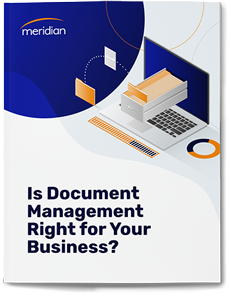
Depending on the type of business you have, an enterprise content management (ECM) solution in coalition with a document management system (DCM) can offer to streamline processes for your organization so you can stop worrying about gaps in your internal processes and start focusing on other priorities for your business. In this guide we will review what document management is as well as include a workbook you can use to identify the needs of your document management solutions.

Not a problem! Enter your email below for a downloadable PDF version that you can read on your own time.
Document Management is a component of Workflow Automation that simplifies the process of storing, routing, and retrieving documents in a secure environment. That means greater efficiency and cost savings for your organization.
To implement document management into your business, you will need to prepare your paper files for electronic document management. To establish the best way in organizing paper files into categories, your internal team will need to assess a categorizing system. By being on the same page, you and your team will know exactly where everything lives in the system.
Having a strategic document management solution can help in many ways including:
In the next chapter, we will discuss how the above benefits of implementing a document management system can help your organization achieve optimal efficiency and protection of assets.
Tackling the task of converting large mountains of paper documents into a digital form may be daunting. However, the time spent implementing an electronic document management system (DMS) provides businesses the ability to streamline workflow and scale business-critical processes. Here are the top benefits of implementing a document management system.
Commercial property costs are increasing, meaning the cost required to store paper documents is increasing. DMS can reduce the need for file cabinets and allow for additional office space to be used, while the paper documents that need to be kept as hard copies can often be stored in offsite vaults.
Document security is essential for a business of any size. DMS provides control over sensitive documents and is controlled through the folder level for specified groups and individuals in your organization. DMS leaves an audit trail of those that viewed, edited, or accessed a document. Managed documents are highly traceable and are tagged for automatic alerts.
Compliance requirements for different types of documents can be complex. By not following these requirements, businesses can face fines, revoked licenses, and in some cases, criminal liability. Some federal and state regulatory compliance requirements like Sarbanes Oxley and HIPAA mandate that organizations follow security and privacy guidelines. To avoid the risk of non-compliance, document management systems records retention schedules and automate new documents for classification and storage.
Searching for documents is not only costly in time, but it's costly in money as well. Office works spend up to 40% of their day searching for printed documents. This time adds up to $20 in labor to file a document, $120 in labor to find a misfiled document, and $220 in labor to reproduce a lost document. All of these costs add up and restricts productivity, budget, and potential.
A document management system saves time. If you're searching for a word or key phrase in a document, DMS can retrieve the file you searching for. Additionally, DMS integrates with business applications to facilitate ease in assessing documents remotely.
Working on a team requires the ability to quickly access shared content so team members can collaborate on topics of discussion. Documents captured from sources can be accessed from multiple locations, making sharing documents over email via the Internet - possible.
Any document management system should include a data backup and disaster recovery plan. With digital archiving as a backup, paper documents are protected from fire and floods. Documents stored in a DMS are highly traceable using a range of tracking criteria. Document tracking reduces the possibility of lost and misfiled documents.
Implementing a DMS can directly correlate with increased productivity. Without having to worry about the long wait times in document retrieval your employees will feel relieved and increase client satisfaction. Aside from the benefits already listed, here is a shortlist of intangible advantages that a DMS offers businesses:
With understanding the benefits of implementing a document management system you will be able to assess whether or not your business needs assistance in information management.
Complete this workbook to identify any needs that document management solutions could meet, as well as opportunities to create efficiencies and realize ROI.
Let us show you how Document Management Solutions can help you create, implement and manage an effective information management and business process automation strategy to increase efficiency and ROI.

888-289-2776
info@whymeridian.com
Meridian Imaging Solutions
1595 Spring Hill Rd, Suite 450
Vienna, VA 22182
© 2025 Meridian Imaging Solutions | Privacy Policy